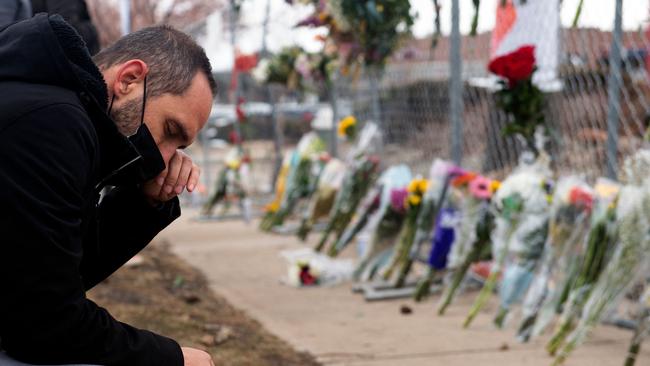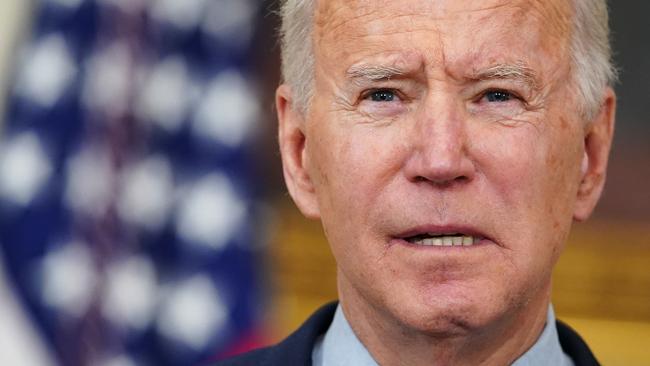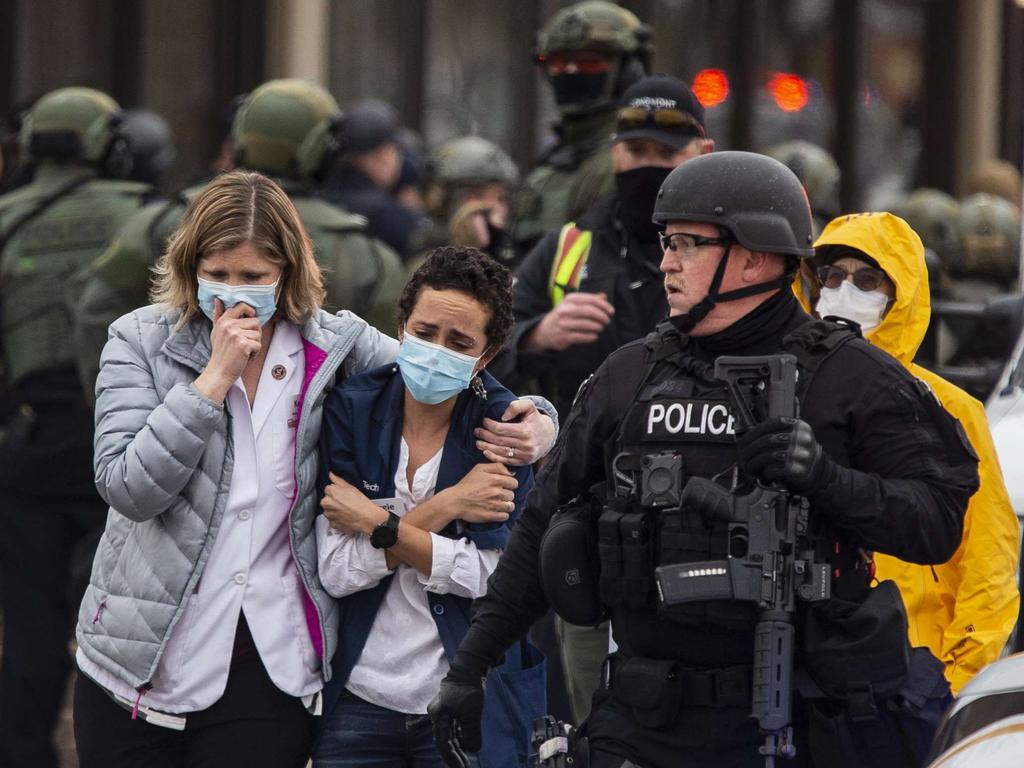Biden calls to strengthen gun control after shooting in Colorado
Gun issue fans the debate over changing Senate rules to end decades of partisan stalemate.

President Biden called for tightening gun laws Tuesday after a supermarket massacre in Boulder, Colorado, reviving debate in the Senate and ratcheting up pressure on Democrats divided over whether to change the chamber’s rules to end decades of partisan stalemate.
The Monday night shooting, in which 10 people died, came just days after shootings at spas in Atlanta that killed eight people last week, including six women of Asian descent. The pair of killings, after a lull in mass killings during the pandemic, swiftly intensified a long-running debate on Capitol Hill about how to prevent such violence and moved it to the top of the new president’s agenda.
“I don’t need to wait another minute, let alone an hour, to take common sense steps that will save lives in the future,” Mr. Biden said. “I urge my colleagues in the House and Senate to act.” The White House said he was also contemplating unspecified executive actions.
Democrats, who narrowly control the 50-50 Senate, said Tuesday that they would bring up for votes legislation passed earlier by the Democratic-led House to expand background checks, with the goal of flagging people with criminal or mental-health histories that disqualify them from gun ownership. But without the support of 10 Senate Republicans, those bills stand no chance of becoming law unless a bipartisan deal is struck or Democrats decide to change the chamber’s rules to require a simple majority to advance legislation instead of 60 votes.
“If the filibuster is the only thing that stops a wildly popular proposal from becoming law, then, it’s certainly, it should be part of the conversation as to why the rules need to change,” said Sen. Chris Murphy (D., Conn.), who became one of the Senate’s most outspoken proponents of tightening gun laws after the Sandy Hook elementary school shooting in his state in 2012. Mr. Murphy said Tuesday he was talking to both Democratic and GOP colleagues in hopes of reaching an agreement.

Republicans say many Democratic proposals would do little to address gun violence but would instead infringe on Second Amendment rights, underlining the starkly different stances of the two parties in the face of decades of mass shootings through both Democratic and Republican administrations.
“Every time there’s a shooting we play this ridiculous theatre where this committee gets together and proposes a bunch of laws that would do nothing to stop these murders,” said Sen. Ted Cruz (R., Texas), a member of the Judiciary Committee, which held a gun-violence hearing Tuesday. “What happens in this committee after every mass shooting is Democrats propose taking away guns from law-abiding citizens, because that’s their political objective.” President Biden urged Congress to pass legislation approved by the House earlier this month that would expand background checks to nearly all gun sales and extend the window for background checks to 10 days from three days, giving law-enforcement authorities more time to vet individuals before they can buy guns.
Mr. Biden also called on Congress to ban assault-style weapons and high-capacity magazines. The Boulder suspect used an AR-style rifle in the attack, law-enforcement officials briefed on the investigation said. A 1994 law banned certain semiautomatic weapons and set a limit on high-capacity magazines. When the prohibition expired in 2004, Congress, then controlled by Republicans, didn’t renew it.

Proposals from Sen. Dianne Feinstein (D., Calif.) and others to ban the manufacture and sale of such weapons and ban high-capacity ammunition magazines have failed in the Senate in previous years.
Mr. Biden, asked by reporters in Ohio if he had enough political capital to move forward on gun control measures in Congress, said, “I hope so. I don’t know. I haven’t done any counting yet.” The White House declined to elaborate Tuesday on what specific executive actions the president may be contemplating, but White House press secretary Jen Psaki said the administration was looking to “address not just gun safety measures but violence in communities. That has been under discussion.” Gun-control groups have urged the president to take executive action, including appointing a senior aide tasked with gun-policy oversight and pursuing stricter enforcement of existing rules.
Senate Majority Leader Chuck Schumer (D., N.Y.) said the Senate would vote on the House-passed legislation, although he didn’t specify when. He also didn’t indicate whether Democrats would seek to lower the threshold for passing legislation to just a simple majority if no bipartisan agreement can be reached.
On Tuesday the House bills appeared short of the 60 votes needed to clear procedural hurdles in the Senate. Sen. Joe Manchin (D., W.Va.), who had helped craft a bill expanding background checks in 2013, said he didn’t support the House legislation.
In 2013 the Senate narrowly blocked legislation from Mr. Manchin and Pat Toomey (R., Pa.) that would expand background checks to all commercial sales, including all sales advertised online and at gun shows. Currently, the checks are needed only for sales by federally licensed dealers. The House bill expands background checks to nearly all sales, but includes exemptions for family members and some temporary transfers while hunting or at a shooting range, for example.
Mr. Toomey said he was talking to colleagues about whether they could tweak the Manchin-Toomey proposal to garner enough bipartisan support for it to pass.
“We’re having preliminary conversations and I hope we can get something across the goal line, but it’s very difficult,” he told reporters Tuesday. Mr. Toomey said he didn’t think the House gun bills could pass the Senate.
Public outrage
Public outrage over the latest mass shootings is expected to increase pressure on Democrats from the party’s left wing to take action while they maintain full control of government; but Democrats are at least two votes shy of the 51 needed to kill off the legislative filibuster. Mr. Biden said last week that he supports bringing back a requirement that senators must be present and talking on the floor to block bills.
“Senators in Washington have a choice to make: save lives or save the filibuster. You cannot do both,” said Pennsylvania Lt. Gov. John Fetterman, who is running for the state’s open Senate seat after Mr. Toomey retires.

Many Republicans said Tuesday that expanding background checks would not be sufficient to prevent many of the mass shootings that have horrified the country over recent years, since in many cases the shooters successfully cleared a background check. It wasn’t yet known Tuesday how the suspect in the Boulder shooting obtained his firearm.
“I’m not trying to perfectly equate these two, but we have a lot of drunk drivers in America that kill a lot of people,” Sen. John Kennedy (R., La.) said during a Senate hearing Tuesday on reducing gun violence. “What many folks on my side of the aisle are trying to say is the answer is not to get rid of all sober drivers. The answer is to concentrate on the problem.” Some Republicans including Sen. Marco Rubio (R., Fla.) have supported so-called red flag laws aimed at allowing courts to temporarily take guns from people deemed dangerous.
Many Democrats support such measures, but want to pass additional safeguards. Ken Thomas contributed to this article.
Wall Street Journal







To join the conversation, please log in. Don't have an account? Register
Join the conversation, you are commenting as Logout